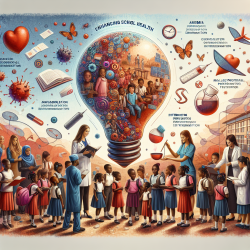Understanding the GRIA2 Variant: A Key to Improved Child Development
As a dedicated speech-language pathologist, the quest for better outcomes for children is at the heart of our practice. With the ever-evolving landscape of genetic research, understanding the implications of specific genetic variants, such as the GRIA2 variant, can significantly enhance our ability to tailor interventions for children with complex developmental profiles.
The GRIA2 Variant: What We Know
The research article titled "De novo missense variant in GRIA2 in a patient with global developmental delay, autism spectrum disorder, and epileptic encephalopathy" provides critical insights into how a single genetic mutation can impact a child's development. This study identified a novel de novo missense variant in the GRIA2 gene, which is associated with a range of neurodevelopmental disorders, including autism spectrum disorder (ASD) and epileptic encephalopathy.
The GRIA2 gene encodes a subunit of the AMPA receptor, which is crucial for fast excitatory neurotransmission in the brain. Variants in this gene can lead to significant developmental challenges, including language impairments and behavioral abnormalities. The study highlights the importance of genetic testing in diagnosing and understanding these complex conditions, providing a foundation for targeted therapeutic interventions.
Implications for Practitioners
For practitioners in the field of speech-language pathology, understanding the genetic underpinnings of a child's developmental challenges can inform more effective intervention strategies. Here are some key takeaways from the research:
- Early Identification: Genetic testing, including whole-genome sequencing, can be a valuable tool in identifying children with GRIA2 variants. Early identification allows for timely intervention, which is crucial for optimal outcomes.
- Tailored Interventions: Understanding the specific genetic and phenotypic profile of a child can guide the development of personalized therapy plans. For instance, children with GRIA2 variants may benefit from interventions focused on language development and social communication skills.
- Collaborative Care: Working closely with geneticists and other healthcare professionals can enhance the care provided to children with complex developmental profiles. A multidisciplinary approach ensures that all aspects of a child's development are addressed.
Encouraging Further Research
The findings from the GRIA2 study underscore the need for continued research into the genetic basis of neurodevelopmental disorders. Practitioners are encouraged to stay informed about the latest research developments and consider participating in research studies that explore the genetic and environmental factors influencing child development.
Additionally, engaging in professional development opportunities, such as workshops and conferences focused on genetics and child development, can enhance practitioners' knowledge and skills, ultimately benefiting the children and families they serve.
Conclusion
The discovery of the GRIA2 variant and its implications for child development represents a significant advancement in our understanding of neurodevelopmental disorders. By integrating genetic insights into clinical practice, speech-language pathologists can provide more targeted and effective interventions, paving the way for improved outcomes for children with complex developmental profiles.
To read the original research paper, please follow this link: De novo missense variant in GRIA2 in a patient with global developmental delay, autism spectrum disorder, and epileptic encephalopathy.










